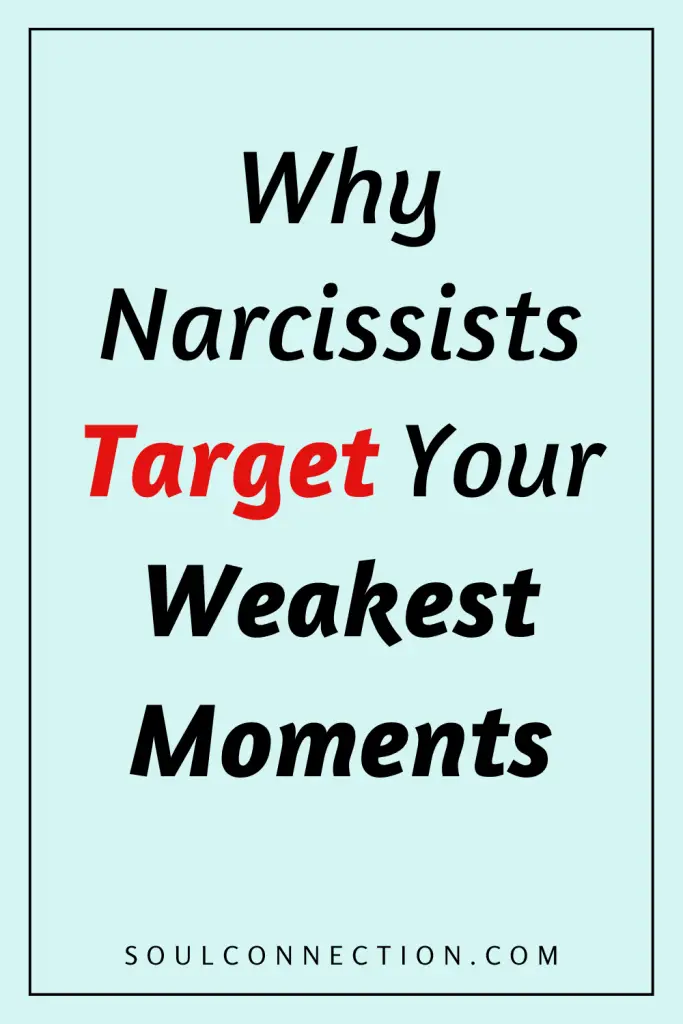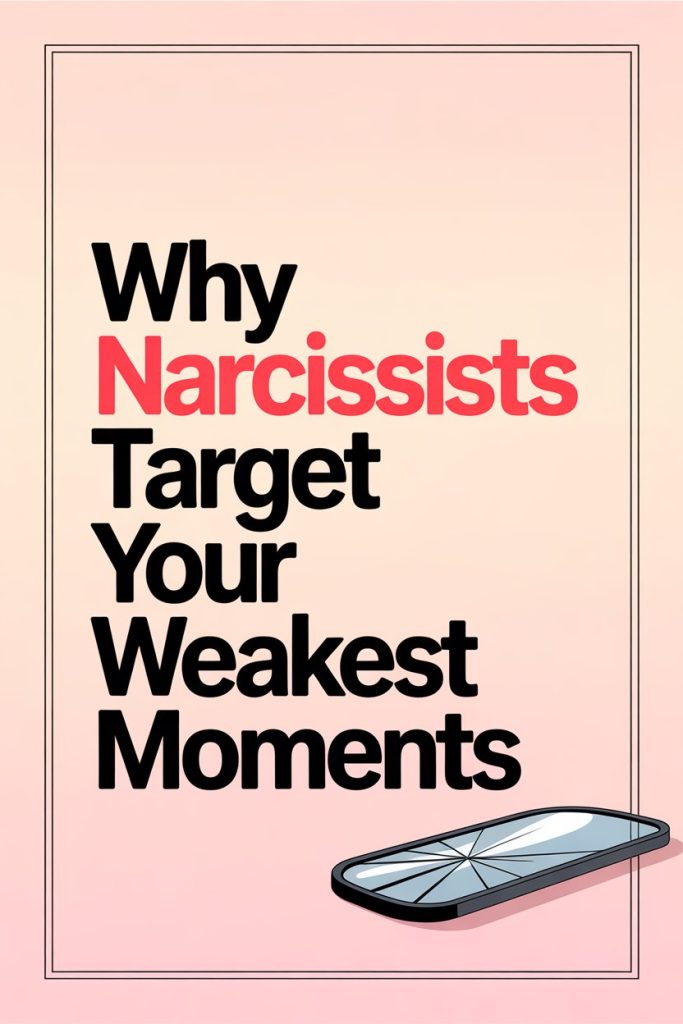Ever notice how narcissists pop up or turn up the charm precisely when you’re down in the dumps? It’s not a coincidence.
They seem to have a sixth sense for sniffing out vulnerability, and they use it to their advantage. There’s more to this than meets the eye—no magic, just manipulation masked as concern.
You’re about to see why your low points make you a beacon for those with narcissistic personalities, what’s actually going on behind their calculated kindness, and, most importantly, how you can keep your dignity (and sanity) firmly in place when you’re feeling fragile.
How Vulnerability Becomes a Welcome Mat
Vulnerability is as human as spilled coffee on a Monday morning. It’s when you’re grieving a breakup, reeling from a job loss, or wrestling with self-doubt that you’re most likely to attract narcissists.
Not because you’re weak, but because you’re open. Raw emotions leave the gate wide open, and narcissists love an unsecured border.
When your usual confidence is out of office, a narcissist sees a prime opportunity. Why? Because vulnerability signals a craving for reassurance, connection, or a listening ear—exactly what they know how to impersonate (for a while).
Like a cat who only shows up when there’s tuna, they arrive when there’s something in it for them.
What Draws Narcissists to Emotional Low Points
Narcissists aren’t looking to fix your problems; they’re scanning for cracks in your emotional armor. The lower your guard, the easier it is to squeeze in their influence.
Misery loves company, but narcissists love power. When you’re wobbling, establishing control is a breeze.
A tough week at work? Trouble with friends? Family drama? These moments can leave you second-guessing your worth or your judgment.
Narcissists listen just long enough to gather intel, then swoop in offering solutions or validation. But there’s always a price—it’s about boosting their ego, not healing yours.
The Sweet Trap of Faux Empathy
You’re sobbing into your pillow, and suddenly, the narcissist is all ears—texting, calling, dropping by with ice cream (or whatever cliché comfort suits the season).
Their empathy feels genuine because it’s tailored to your wounds. For a moment, you might believe you’ve finally found someone who gets you.
Here’s the (not-so) shocking truth: that empathy is an act. Narcissists are Oscar-worthy performers when it comes to mirroring feelings.
Their “caring” is nothing more than a strategic maneuver to cement their position in your life. Once you’re hooked, the mask slips and compassion takes a long holiday.
Mirroring Your Needs Instead of Meeting Them
Genuine support means understanding and respecting boundaries. Narcissists, on the other hand, become chameleons—mirroring your hopes, dreams, and insecurities right back at you.
The effect? You feel seen, but really, you’re only seeing a reflection of your own needs.
When you’re at your lowest, you’re especially hungry for someone to say, “I get it.” Narcissists serve this up with a side of charm, but only to win favor.
The moment you recover your strength or push for deeper connection, that mirror gets shattered—leaving you wondering if the warmth you felt was ever real.
Control, Not Comfort
Comfort is not a narcissist’s true goal—it’s control. They swoop in during your weakest moments not to lift you up but to lock you down.
It starts with playing the rescuer, but quickly turns into subtle (or not-so-subtle) demands for your loyalty, admiration, or gratitude.
You might find yourself feeling indebted, guilty, or even suspiciously dependent. Don’t blame yourself—it’s a well-honed routine.
Their reassurance comes with invisible strings, and pulling away often triggers guilt trips or emotional sabotage.
Why Boundaries Crumble When You’re Down
Healthy boundaries are harder to enforce when you’re struggling. You might overlook red flags because you crave comfort, or make excuses for pushy behavior because “at least they’re there.”
Narcissists count on this. They push and probe, testing how far they can go before you protest.
Once a narcissist senses that your boundaries are shaky, they’ll gradually shift from supportive to controlling—often without you realizing it’s happening.
The transformation is so subtle that by the time you notice, you’re already knee-deep in their drama.
How Gaslighting Locks You In
Here comes the gaslighting—the narcissist’s favorite party trick.
When you’re uncertain, they twist your reality just enough to make you doubt your memory, feelings, or judgment. “You’re too sensitive,” or “You’re imagining things,” becomes their refrain.
At your lowest, you’re already battling self-doubt, which makes their manipulation all the more effective. It’s a vicious cycle: the more you question yourself, the more you lean on them for reassurance. And round it goes.
The Promise (and Peril) of “Saving” You
Narcissists love to play the hero. Swooping in with grand gestures, they cast themselves as your savior—a role that flatters their ego and secures your gratitude.
They might fix your laptop, listen to your latest heartbreak, or offer advice that, on the surface, sounds wise.
Here’s the catch: every act of “saving” is transactional. You’re expected to repay their kindness with unwavering attention, praise, or compliance.
The minute you stop playing the damsel (or dude) in distress, their interest wanes—or worse, they turn on you.
Why Talking Back Is So Difficult
When you’re exhausted or demoralized, advocating for yourself feels like a marathon.
Narcissists exploit this, turning disagreements into high drama or emotional warfare. They bait you into defending yourself, then twist your words to make you look unreasonable.
Speaking up is doubly hard when you fear losing what little support you think you have. Narcissists use this fear to keep you silent and compliant, often convincing you that you’re the problem.
It’s emotional quicksand—every struggle drags you deeper.
Spotting the Patterns So You Don’t Get Played
Recognizing how narcissists operate is your best defense. Watch for sudden interest when you’re struggling, love-bombing out of nowhere, or a pattern of grand gestures with a hint of “You owe me.”
If empathy feels performative or you sense strings attached, take note.
Trust your gut. If something feels off—even if you can’t explain why—it probably is. Keep tabs on whether you feel better or worse after spending time with them. Emotional support should lift you up, not leave you feeling drained or obligated.
How to Guard Your Heart When You’re Fragile
Awareness is your armor. When life throws a curveball and you find yourself feeling shaky, reach out to friends, professionals, or anyone with a proven record of real empathy.
Keep narcissists at arm’s length until you’re strong enough to spot their schemes.
Set boundaries like your sanity depends on it (because, frankly, it does). If someone swoops in with over-the-top concern, take a breath. Ask yourself whether their attention feels safe or suffocating.
Small steps matter: Write down your feelings to check if someone’s actions match their words. Don’t be shy about seeking outside perspective—anyone who tries to isolate you from others deserves a one-way ticket out of your life.
When Recovery Becomes the Best Revenge
Nothing frustrates a narcissist more than seeing you bounce back. They thrive on your low points, so reclaiming your strength is the ultimate plot twist. No need for dramatic showdowns; quiet confidence is kryptonite to manipulation.
Gather your support system, rebuild at your own pace, and keep those boundaries in place for next time.
There’s no shame in having been targeted—narcissists are practiced predators. What matters is what you do with the awareness you now have.
Your Weak Moments Aren’t Open Invitations
Everyone has moments of struggle—that’s part of being gloriously, messily human. While narcissists are drawn to those low points, you’re not doomed to be their favorite project or next conquest.
A little awareness, a pinch of skepticism, and some well-placed boundaries can keep your weakest moments from becoming their playground.
The world is full of people who genuinely care. Trust your instincts, keep your guard up when you’re feeling fragile, and remember: You’re nobody’s project. Not even on your worst day.


